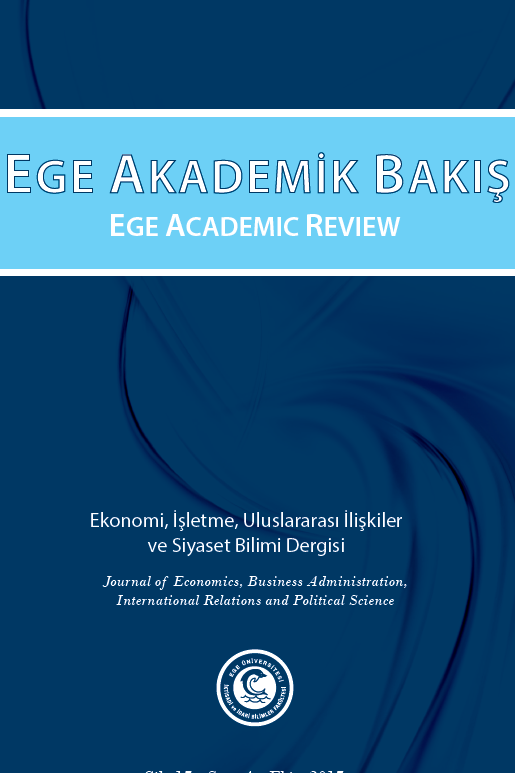Döviz Kurları Enflasyonu Etkiler Mi? Gelişmekte Olan Piyasa Ekonomilerinden Ispat
Ters dolarizasyon, enflasyon hedeflemesi politikası, döviz kuru geçiş etkisi
Do Exchange Rates Affect Inflation? Evidence from Emerging Market Economies
___
- Asia Economic Monitor. (2011) “Managing Com- modity Price Volatility and Inflation in Emerging East Asia” Emerging East Asia-A Regional Economic Update, July 2011.
- Baqueiro, A., De León, A.D. ve Torres, A. (2002) “Fear of Floating or Fear of Inflation? The Role of the Exchange Rate Pass-Through” BIS Papers, No:19.
- Calvo, G.A., Izquierdo, L. ve Mejía, F. (2008) “Systemic Sudden Stops: The Relevance of Balance-Sheet Effects and Financial Integration” IMF Working Paper Series No:14026.
- Calvo, G. Ve Reinhart, C. (2002) “Fear of Floating” Quarterly Journal of Economics, 117(2):379-408.
- Campa, J. ve Goldberg, L. (2006) “Pass Through of Exchange Rates to Consumption Prices: What has Changed and Why?” NBER Working Paper Series, No:12547.
- Choudhri, E.U. ve Hakura, D.S (2001) “Exchange Rate Pass-Through to Domestic Prices: Does the Inflati- onary Environment Matter?” IMF Working Paper Series, No:01/194.
- De Gregorio, J. (2012) “Commodity Prices, Mone- tary Policy and Inflation” Prepared for the Conference on Policy Responses to Commodity Price Movements, Organized by the IMF and the Central Bank of Turkey, April.
- Devereux, M.B., Lane, P.R. ve Xu, J. (2006) “Exc- hange Rates and Monetary Policy in Emerging Market Economies” The Economic Journal, 116:1-42.
- Sebastian, E. (2001) “Exchange Rate Regimes, Ca- pital Flows and Crisis Prevention” NBER Working Pa- pers Series, No:8529.
- Eichengreen, B. ve Hausmann, R. (1999) “Exchange Rates and Financial Fragility” National Bureau of Eco- nomic Research Working Paper Series , No: 7418.
- Fischer, S. (2001) “Exchange Rate Regimes: Is the Bipolar View Correct?” Journal of Economic Perspectives, 15(2):3-24.
- Frankel, J.A., Parsley, D.C. ve Wei, SJ. (2005) “Slow Pass-Through around the World: A New Import for Developing Countries” NBER Working Paper Series, No:11199.
- Furlong, F. ve Ingenito, R. (1996) “Commodity Prices and Inflation” Frbsf Economic Review, 2:27-47.
- Ghosh, A.R. (2006) “Capital Account Crises: Les- sons for Crisis Prevention” Crisis Prevention in Emer- ging Markets International Monetary Fund - Singapore Government High Level Seminar Singapore, July 10-11.
- Hahn, E. (2003) “Pass Through of External Shocks to Euro Area Inflation” ECB Working Paper Series, No:243.
- Honohan, P. ve Anqing, S. (2001) “Deposit Dollari- zation and the Financial Sector in Emerging Economies” World Bank Working Paper Series.
- Hunt, B. ve Isard, P. (2003) “Some Implications for Monetary Policy of Uncertain Exchange Rate Pass- Through” IMF Working Paper Series, No:25.
- Ihrig, J., Marazzi, M. ve Rothenberg, A. (2006) “Exchange Rate Pass-Through in G-7 Countries” FED of Governors, International Finance Discussion Paper, No:851.
- Kara, H.,Küçük, H., Özkale, U. ve Yücel, E. (2005) “Exchange Rate Pass-Through in Turkey: Has It Chan- ged and to What Extent?” TCMB RD Working Paper Series No:5/4.
- McCarthy, J. (2000) “Pass Through of Exchange Rates and Import Prices to Domestic Inflation in Some Industrialized Economies” FED of NY Staff Report, No:111.
- Mihaljek, D. ve Klau, M.(2000) “A Note on the Pass-Through from Exchange Rate and Foreign Price Changes to Inflation in Selected Emerging Market Eco- nomies” BIS Papers, 8:69-81.
- Mishkin, S.F. (2008) “Exchange Rate Pass-Through and Monetary Policy” Conference on Monetary Policy “Jarle Bergo Colloquium: Globalisation and Monetary Policy”, 7 March, Oslo.
- Oduncu, A., Değerli, A. ve Kılınç, Z. (2011) “The Role of Commoditiy Price on Emerging Country Inflati- on Dynamica” International Research Journal Finance and Economics, 74:84-88.
- Özçiçek, Ö. (2007) “Türkiye’de Ekonomik Krizler ve Döviz Kuru Enflasyon İlişkisi” Gazi Üniversitesi İktisadi ve İdari Bilimler Fakültesi Dergisi, 9(1):71- 80.
- Peker, O. ve S. Görmüş. (2008) “Türkiye’de Dö- viz Kurunun Enflasyonist Etkileri” Süleyman Demirel Üniversitesi İktisadi ve İdari Bilimler Fakültesi Dergisi, 13(2):187- 202.
- Reinhart, C.M. (2006) “Addicted to Dolars” NBER Working Paper Series.
- Summers, H.L. (2000) “International Financial Crises: Causes, Prevention, and Cures” The American Economic Review, 90(2):1-16. Stone, M.R. ve Ashok, B. (2004) “A New Taxonomy of Monetary Regimes” IMF Working Paper Series, No:191.
- Taylor, J. (2000) “Low Inflation Pass-Through, and the Pricing Power of Firms” European Economic Review, 44:1389-1408.
- Türkcan, K. (2005) “Exchange Rate Pass-Through Elasticities in Final and Intermediate Goods: The Case of Turkey” Yönetim ve Ekonomi, 12(1):61-78.
- Velasco, A. (2002) “Exchange Rates in Emerging Markets: Floating Toward the Future” Banco de México (eds), Stabilization and monetary policy: the internatio- nal experience, Mexico.
- ISSN: 1303-099X
- Yayın Aralığı: Yılda 4 Sayı
- Başlangıç: 2000
- Yayıncı: Ege Üniversitesi
Fehim BAKIRCI, Seyedhadi Eslamian SHİRAZ, Ali SATTARY
Türk Bankacılık Sektöründe Karlılığın Dinamikleri
Terörizmin Türk Hisse Senedi Piyasası Üzerindeki Etkileri
Döviz Kurları Enflasyonu Etkiler Mi? Gelişmekte Olan Piyasa Ekonomilerinden Ispat
Baki DEMİREL, Baris ALPASLAN, Emre GÜNEŞER BOZDAĞ
İMKB’de İşlem Gören Aracı Kuruluş Varantları İçin Etkin Fiyatlama Modelinin Belirlenmesi
